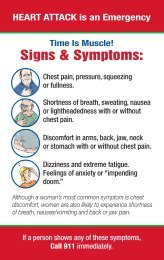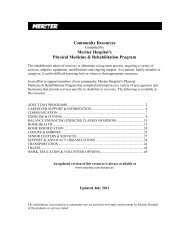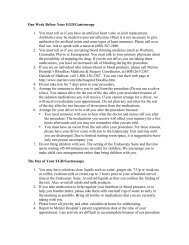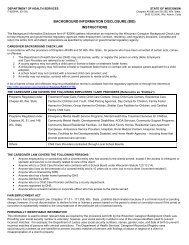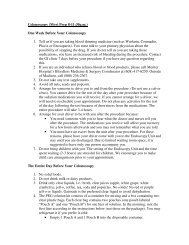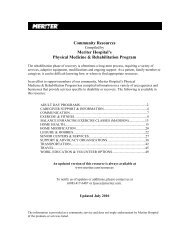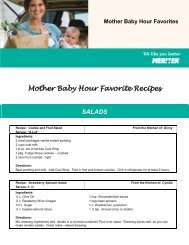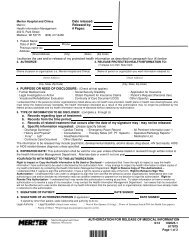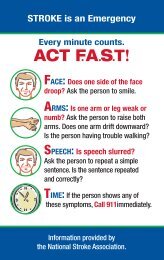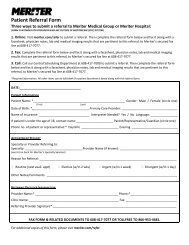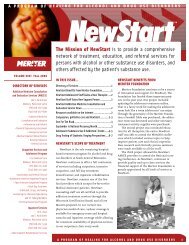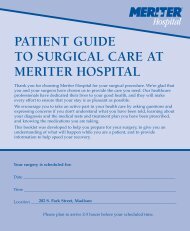A Guide To Your New Family's First Weeks - Meriter Health Services
A Guide To Your New Family's First Weeks - Meriter Health Services
A Guide To Your New Family's First Weeks - Meriter Health Services
You also want an ePaper? Increase the reach of your titles
YUMPU automatically turns print PDFs into web optimized ePapers that Google loves.
How <strong>Your</strong> Milk Changes<br />
<strong>Your</strong> body makes colostrum for the first several days<br />
after giving birth. Colostrum is low in volume but has a<br />
high concentration of nutrients and is rich in infectionfighting<br />
antibodies. For most healthy full-term babies<br />
who are nursing well, colostrum provides all of the<br />
nutrition and fluid they need in the first<br />
few days.<br />
<strong>Your</strong> breast milk will start coming in by day three or<br />
four, and fully transition to mature milk by 10-14 days.<br />
<strong>Your</strong> breasts will start to feel fuller and heavier, and<br />
the milk supply becomes more plentiful. You may also<br />
notice the following:<br />
• Warmth or tingling in your breasts before or during<br />
nursing.<br />
• Leaking from one side while nursing on the other.<br />
• Hearing your baby swallowing or gulping.<br />
• <strong>Your</strong> baby will be content for longer periods<br />
between feedings.<br />
How Do I Know If My Baby Is Getting<br />
Enough Milk<br />
Milk production follows the principal of supply and<br />
demand. The amount of milk you produce depends<br />
on the amount of breastfeeding your baby does, and<br />
how much milk she removes. The more your baby<br />
breastfeeds, the more milk your body will make.<br />
The opposite is also true. A mother whose baby<br />
breastfeeds less frequently and instead sucks on a<br />
pacifier or feeds by bottle will make less milk. During<br />
the early weeks, it is important to try to nurse whenever<br />
your baby is interested to develop a good milk supply.<br />
It is normal for a baby to lose weight after birth due to<br />
shedding excess fluids and passing meconium (the first<br />
stool). A weight loss of 5-7% is considered normal.<br />
After several days (when your milk comes in), your<br />
baby should begin to gain weight, averaging about 6<br />
ounces per week. <strong>Your</strong> baby should be at or above his<br />
birth weight by 2 weeks of age. We will check your<br />
baby’s weight while you are in the hospital and your<br />
baby’s health care provider will continue to check it<br />
after discharge.<br />
Ways to tell if your baby is getting<br />
enough milk.<br />
• <strong>Your</strong> baby is eating 8 or more times in 24 hours<br />
• You baby is wetting and stooling enough diapers<br />
within 24 hours (see feeding log on page 65-69)<br />
• <strong>Your</strong> baby is alert and active between feeds or<br />
sleeping well (Not fussy or restless)<br />
• <strong>Your</strong> breasts feel heavy and full before a feeding,<br />
lighter and “empty” after a feeding<br />
• <strong>Your</strong> baby has not lost more than 7% of the<br />
birth weight in the first days after birth<br />
• <strong>Your</strong> baby appears satisfied after a feeding.<br />
• <strong>Your</strong> baby is back to birth weight by 2 weeks<br />
<strong>Your</strong> Milk Supply<br />
As long as your baby is nursing eight to 12 times per<br />
day, is meeting the goals for wet and soiled diapers,<br />
and is gaining weight well, your milk supply is fine.<br />
Talk with your health care provider if your baby is<br />
not meeting the goals for wet or stool diapers on<br />
your feeding log, or you are concerned about how<br />
your baby is growing.<br />
Growth Spurts<br />
Sometimes mothers think their milk supply has<br />
decreased due to their baby wanting to nurse more<br />
often than usual. This may occur during baby’s fussy<br />
periods. <strong>Your</strong> baby may also want to feed more often<br />
because he is going through a growth spurt. Growth<br />
spurts commonly occur during the second to third<br />
week, around six weeks and at three months. Feeding<br />
routines for your baby—as far as frequency and length<br />
of feedings—change over time. The fullness of your<br />
breasts will vary, this is normal.<br />
If you are concerned that your milk supply is low:<br />
• Nurse more frequently. Nurse your baby every 1 1 ⁄2-2<br />
hours. Try to switch sides so that you are feeding<br />
from each breast twice during a feeding. Massage<br />
your breast before and during a feeding.<br />
• Reduce your stress and workload as much as<br />
possible. Rest, relax, eat and drink well.<br />
• Avoid bottles and supplements, unless<br />
recommended by your health care provider. If<br />
recommended, try offering supplements after<br />
breastfeeding.<br />
• Consider pumping 5-10 minutes after breastfeeding<br />
to empty your breasts more fully, which will tell<br />
your body to make more milk. (See pages 29-30 on<br />
expressing your breast milk.)<br />
• Eliminate the use of pacifiers. Allow your baby to<br />
suckle at your breast whenever he wants to suck.<br />
25



